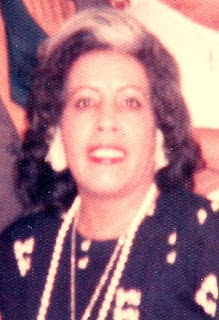
This morning, around 1:25AM, Ana Olivia Cruzata Marrero de Campello, his wife of over 60 years, and my beloved mother, passed on on the day of her 97th birthday.
If my father was an oak, then my mother was an equally strong, but also very pliable, and elegant tree. When hurricanes attack the main lands of the world, the strong tall trees often fall, but the pliable ones, like plantain trees, always give with the wind, and survive the storms, and thrive in the drenching rains.
My mother was like a an aged plantain tree, not only immensely strong and pliable, but also giving and nurturing.
Like many Cuban women of her generation and her social-economic background, she had never worked for a living in Cuba, and yet within a few days of our arrival in New York in the 1960s, she was working long hours in a sewing factory, putting her formidable seamstress skills, honed in the social sewing and embroidery gathering of young Cuban girls, to use in the “piece work” process of the New York sewing factories.
I remember as a child in Brooklyn, that women used to bring her fabric and a page from a magazine with a woman wearing a dress. Without the benefit of a sewing pattern, my mother would whip up a copy of the dress that was more often than not probably better made than the original. As the word of her skills spread, so did her customers and soon she was making more money working at home than at the factory – but she kept both jobs.
I once noted to her that I admired the courage that it must have taken her to leave her family and immigrate to the United States. “We didn’t come here as immigrants,” she corrected me. “We came as political refugees, and I initially thought that we’d be back in Cuba within a few years at the most.”
When the brutal Castro dictatorship refused to loosen its stranglehold on her birth place, she became an immigrant, and from there on an American citizen from her white-streaked hair down to her heel bone (that’s a Cuban saying). Like my father, she loved her adopted country with a ferocity, that I sometimes feel that only people who have been bloodied by Communism can feel for a new, free homeland.
As as I’ve noted before, Cubans are archaic immigrants… we love this great nation because we recognize its singular and unique greatness; perhaps it is because our forebears had the same chance at greatness and blew it.
I remember as a teenager, once I started going out to parties and things at night on my own (around age 16 or so), that my mother would wait up for me, sitting by the third floor window of our Brooklyn apartment, where she could survey the whole neighborhood and see as far as the elevated LL subway station a few blocks away, to watch me descend the station stairs and trace my way home.
My mother was always fit and, as once described by my father, “flaca como un fusil” (as slim as a rifle). She was strong and fast. She was also quiet, but never silenced, and when needed, could and would command attention.
My mother was always well dressed and superbly coiffed. When we’d go to parties and events, women would always ask her where she’d gotten that dress! The answer was always the same: she’d made it!
At least once a week, to my father’s dismay, and in spite of his demands that my mother stop it, she’d get her hair done at the nearby peluqueria (hair dresser).
My dad knew, and respected his limits with my mother.
I remember one time that my father and I were returning from shopping at the supermarket, dragging one of those wheeled folding carts that could carry four full paper grocery bags. It had been snowing, so the Brooklyn streets were wet and muddy.
When we got to our apartment my father opened the door. He then stood there.
“Go in!” I demanded.
“We’ll have to wait,” he said gloomily, “Your mother mopped the floor and it’s still wet.” This giant, tough, street-brawling Galician then looked at me sheepishly, “I’d rather walk through a mine field than step on your mother’s wet floor.”
I learned a lesson there.
She used to delight in telling stories how, as a child, she would often win the horse races that kids staged around the small country towns where she was raised in Oriente province, where her father was a Mayoral.






